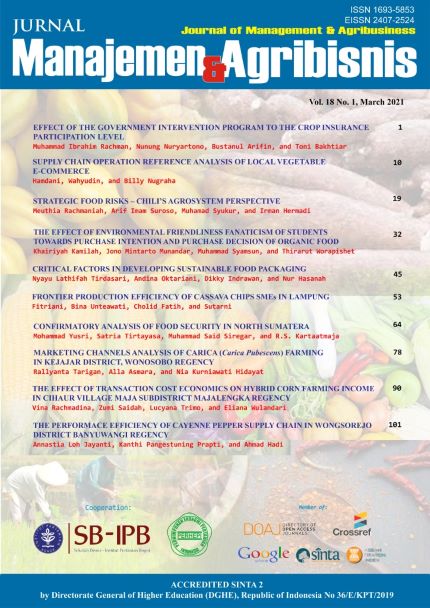FRONTIER PRODUCTION EFFICIENCY OF CASSAVA CHIPS SMEs IN LAMPUNG
Abstract
Strengthening the downstream of the agri-food chain holds a strategic part in enhancing the rural economy. This research was conduct to analyze the frontier production efficiency of cassava chip processing in rural. Then explore the opportunity to develop productivity enhancement of small-scale cassava chips SMEs. The research location referred to the cassava production centre in Lampung, which involved six District regions. Respondent was 60 small-scale cassava industries. Field survey had taken from February to April 2017. Analyzed data designed by the frontier production and binary logistic regression model. The production efficiency value of cassava chips SMEs achieved 61% on average. The achievement value still less than the optimum efficiency. The cassava chips SMEs still operated at a medium level of technical efficiency. Input combination is not optimum, and technology facilities even limited caused the production output not to reach the manufactured capacity the production run under the capacity production. Scale-up the production capacity is necessary. The introduction of the new technology equipment opens the possibilities in scale-up capacity production. The opportunity to adopt the new cassava processing equipment's strongly was affected by human resources skills and appropriate production equipment. The cassava SMEs technology application is significantly determined by experience and production equipment. Furthermore, the proper linkage between SMEs and university or research agencies is necessary to improve technology adoption. The current micro-credit scheme is also vital in provide adequate capital on scale-up production capacity.
Keywords: cassava, efficiency, frontier, rural, SMEs
Authors
Authors who publish with this journal agree to the following terms:
- Authors retain copyright and grant the journal right of first publication with the work simultaneously licensed under a Creative Commons Attribution License that allows others to share the work with an acknowledgement of the work's authorship and initial publication in this journal.
- Authors are able to enter into separate, additional contractual arrangements for the non-exclusive distribution of the journal's published version of the work (e.g., post it to an institutional repository or publish it in a book), with an acknowledgement of its initial publication in this journal.
- Authors are permitted and encouraged to post their work online (e.g., in institutional repositories or on their website) prior to and during the submission process, as it can lead to productive exchanges, as well as earlier and greater citation of published work (See The Effect of Open Access).

